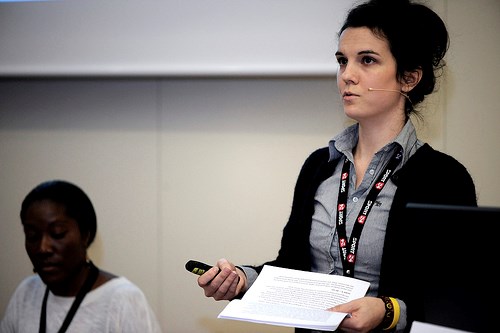On tackling match-fixing and illegal betting

Athletes need protecting and clearer ideas of how match-fixing is tackled, said Katarina Pijetlovic at Play the Game 2013 Photo: Play the Game / Thomas Søndergaard
30.10.2013
By Steve MenaryCarpenter, from lawyers Hill Dickinson, was part of a panel that discussed how match-fixing could be defined and tackled. At London 2012, a Joint Assessment Unit (JAU) was formed by stakeholders looking to tackle illegal betting at an Olympics where the level of legal betting was estimated to be five times higher than in Beijing 2008.
“Every match-fixing case has been initiated by the press; we need to engage with the press,” said Carpenter, who revealed that the five sports subject to the most betting were – in descending order – football, tennis, basketball, volleyball and athletics.
Although an incident where Chinese players threw a badminton match to secure an easier draw in a later round was the most high profile incident at London 2012, Carpenter revealed that 16 issues were reported to the JAU, including an issue with the boxing, which was reported to the unit by the media.
Carpenter added: “There was a co-ordinated approach as we didn’t want stories coming out in the media and blown out of proportion.”
Lack of action can lead to loss of public interest
While the badminton incident at London 2012 was dealt with swiftly by the authorities, another panel member, Turkish journalist Gamze Bal from BordoMavi.net told the audience how an inability to deal with the match-fixing issues in football in Turkey had undermined the public’s perception of the sport.
The Turkish Football Federation has punished 21 defendants for their part in a match-fixing scandal that denied Trabzonspor the title in favour of Fenerbahce but Bal argued that a decision to only punish individuals instead of relegating the clubs involved could see football in Turkey “become a fairy tale rather than fair play.”
Bal said: “This irrational approach to match-fixing could lead to the end of the sport’s integrity. Turkish people are not watching football, they are watching theatre with million dollar players.”
Match-fixing needs clearer definitions agreed two other panellists, Salomeja Zaksaite, a post-doctoral researcher from Mykolas Romeris University in Lithuania, and Karen Jones from the Asser International Sports Law Centre in the Netherlands.
“Criminal law must be the last resort,” argued Zaksaite, who cited examples of players agreeing to draw matches in chess as a form of fixing. Jones floated the idea of the bounty approach practised by the New Orleans Saints in the National Football League and asked whether this was a form of match-fixing.
Panellists agreed this fell under agreed code of conducts instead of match-fixing.
The players also needed protecting and clearer ideas of how match-fixing was tackled argued another panellist, Katarina Pijetlovic, who used the life-ban handed out to German tennis player Daniel Kollerer as an example.
Pijetlovic suggested that the contracts that professional players are forced to sign at the start of each season should be invalid as they are one-sided and not discussed with the players, making any punishment itself invalid.
Education of players
The remaining panellist, Deborah Unger from advocacy group Transparency International, agreed with Carpenter over the need for a co-ordinated approach. Transparency International is working on a programme with professional football leagues in Germany, Italy, Portugal, Greece, Lithuania, England and Scotland to provide education to players over the ethics of gambling.
“Should players be playing poker on the bus?” asked Unger rhetorically.
“There’s a lot of time and competitive instincts there. We need to present these forms of ethical dilemmas to players.
“Education is a good first step for the vulnerable but we need to work in conjunction with enforcement and good policy.”
In addition to this core project, Transparency International is also working with leagues in Norway, Poland, France and Russia. Once the pilot projects are completed, the group hopes to roll out this programme to other leagues in the fight against match-fixing, which the panel agreed could only work with all bodies working together.





